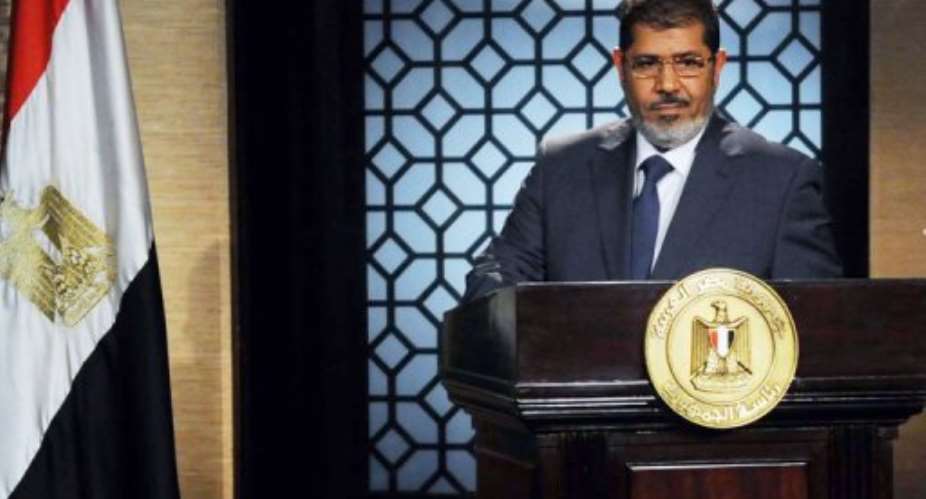CAIRO (AFP) - Egypt's president-elect Mohamed Morsi, the Muslim Brotherhood's winning candidate, benefits from unprecedented electoral legitimacy, but analysts say his leadership will be limited by the entrenched powers of the military.
This situation could lead to alternating periods of compromise and tension between the Brotherhood -- which hopes to loosen the grip of the military -- and the army -- which could exploit future failures by the new president to discredit Islamist rule.
"We are heading towards what might be the most important stage of the Egyptian transition," since the fall of Hosni Mubarak in February 2011, said Khalil al-Anani, Middle East expert at Britain's Durham University.
Morsi, who has promised to be "a president for all Egyptians," is the first civilian head of state since the fall of the monarchy in 1952, with all other presidents coming from the army.
He is also the first to benefit from democratic legitimacy after decades of presidential elections seen more as plebiscites, with the results known in advance.
"Mohamed Morsi has a very strong legitimacy to ask for more powers for the presidency... and at some point the military and SCAF will have to compromise with him," Anani added, referring to the ruling Supreme Council of the Armed Forces.
But the army and other remnants of the former regime "might try to obstruct Morsi from having an easy presidency. He needs to be smart in dealing with the old structures" in Egypt.
Some of the Egyptian press suggested on Monday that Morsi's success would hinge on his ability to accommodate secular and moderate figures within his government, including from Egypt's minority Christian community, to build his support base as a counterweight to the generals' power.
His rival and ex-Mubarak premier Ahmed Shafiq, who won 48.2 percent of the vote in the highly divisive poll, demonstrated that the old regime still has strong support among the Egyptian people.
The presidency that Morsi takes over will be very different from the all-powerful position occupied by his predecessor Mubarak and other Egyptian presidents.
The ruling military council, which says it will hand over executive power by the end of the week, dissolved the Islamist-dominated parliament earlier this month, giving itself legislative powers, control over the new constitution and a broad say in government policy.
The Brotherhood has rejected the move, which effectively strips away any gains made by the Islamist group since the popular uprising, and gives the military the right to veto any legislative or budget proposals.
The SCAF has, in particular, retained the right to block any attempt to extend references to Islamic sharia law in the constitution.
Security will remain divided between the army -- which was also recently granted powers of arrest -- and a police force still largely run by members of the Mubarak regime.
And Morsi will have no say in the existing military hierarchy, since the army declared itself the sole authority in matters relating to its own affairs.
"The military is ready to accommodate an Islamist president, but they have taken precautions," said Mustafa Kamel al-Sayyed, political scientist at Cairo University.
Besides legislative powers, "all the issues relating to national security remain in the hands of the army. In this area, the president cannot do much," he added.
For Gilles Kepel, specialist in political Islam at the Paris Institute of Political Studies (Sciences-Po), "the army have taken measures to trap the presidency in a sort of institutional net."
But the balance of power will not prevent a "logic of cohabitation" between the powerful Muslim Brotherhood and the army," he added.
The Islamists -- notably through their influential local charity networks and their presence in the trade unions -- and political-military system "are two entities that have in practice co-ruled in Egypt since the time of president (Anwar) Sadat."





 Whoever participated in the plunder of the state must be held accountable – Jane...
Whoever participated in the plunder of the state must be held accountable – Jane...
 A vote for John and Jane is a vote to pull Ghana from the precipice of destructi...
A vote for John and Jane is a vote to pull Ghana from the precipice of destructi...
 I’ll repay your abiding confidence with loyalty, understanding and a devotion to...
I’ll repay your abiding confidence with loyalty, understanding and a devotion to...
 ‘I’ve learnt deeply useful lessons for the future' — Serwaa Amihere breaks silen...
‘I’ve learnt deeply useful lessons for the future' — Serwaa Amihere breaks silen...
 I’m sorry for the embarrassment – Serwaa Amihere apologises for leaked sex video
I’m sorry for the embarrassment – Serwaa Amihere apologises for leaked sex video
 Dumsor: Matthew Opoku Prempeh not in charge of Energy sector – Minority
Dumsor: Matthew Opoku Prempeh not in charge of Energy sector – Minority
 Adu Boahen’s murder: Police arrest house help who was in possession of deceased’...
Adu Boahen’s murder: Police arrest house help who was in possession of deceased’...
 Akufo-Addo nominates Felicia Attipoe as Tema West MCE
Akufo-Addo nominates Felicia Attipoe as Tema West MCE
 Election 2024: I can't have someone I defeated twice as my successor – Akufo-Add...
Election 2024: I can't have someone I defeated twice as my successor – Akufo-Add...
